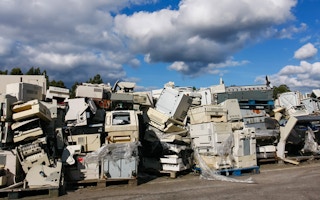Law compilers have been criticised heavily for their decision to allow importing some kinds of scrap which could be used as the input materials for the domestic industrial production.
Understanding the serious consequences to be brought by the waste imports, the compilers drafting the amended law on environment protection still decided to allow importing some scrap metals and alloys, paper, glass and plastics for domestic production.
“It is necessary to reconsider the scrap import,” said Chair of the National Assembly’s Finance and Budget Committee Phung Quoc Hien.
The import scrap cannot recycle themselves. Therefore, Hien has strongly proposed to prohibit the scrap imports in order to rescue Vietnam from becoming a waste ground for developed countries.
According to Nguyen Van Giau, Chair of the National Assembly’s Economics Committee, Vietnam cannot prohibit the scrap import, or it would violate the international commitments.
However, Giau believes that it is necessary to set up technical barriers to restrict the import of scrap.
“
In the first seven months of 2011 alone, Vietnam imported 1.3 million tonnes of scrap steel, an increase of 27 per cent in comparison with the same period of 2010, mostly from the US, South Africa, Australia and the EU
“The law should be designed in a way which only allows importing the scrap which can be used as the low-cost input materials for the domestic production, if they are lacking in Vietnam,” Giau said.
There are 160 enterprises in Vietnam that import scrap, of which, 75 per cent of enterprises import scrap to serve their production and recycling, while the other 18 per cent import scrap for the domestic distribution and the remaining import under the authorisation by others.
According to the Ministry of Natural Resources and the Environment (MONRE), Vietnam imported 2.9 million tonnes of scrap which could be used as a material for production, including scrap iron, plastics, paper.
In the first seven months of 2011 alone, Vietnam imported 1.3 million tonnes of scrap steel, an increase of 27 per cent in comparison with the same period of 2010, mostly from the US, South Africa, Australia and the EU.
It is estimated that hundreds of millions of tonnes of goods of different kinds are imported to Vietnam through official channels. These include the goods that may cause environment pollution, such as old machines and equipment, electronic parts with high contents of hazardous substances.
A report of the Hai Phong City Police, in 2003-2006 alone, 2,300 containers containing 37,000 tonnes of waste lead batteries entered Vietnam through the port. In 2008-2009, about 340 containers of scrap and tens of containers of waste batteries and electronic chips were imported.
At some occasions, 1,000 containers of scrap were stuck at the Hai Phong port. The containers were the temporary imports for re-export later. In principle, they would be re-exported to neighboring countries. However, as the countries then ran the campaigns to strictly control the imports from Vietnam, the containers could not be exported.
In the period from May 2009 to May 2011 alone, the environment police discovered 37 violation cases, in which 3,278 containers with 56,618 tonnes of waste batteries and other goods listed as hazardous waste, were imported.
Minister of MONRE Nguyen Minh Quang noted that the fat profit from the waste import has prompted Vietnamese enterprises to dodge the laws to bring waste to Vietnam.
In many cases, when the prohibited waste was discovered by the police or customs agencies, the owners of the goods did not turn up to receive the imports.

















